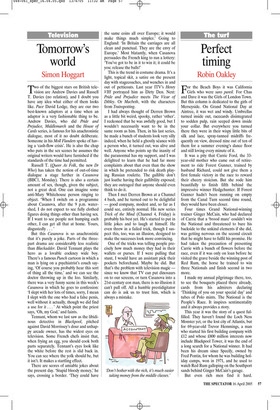Tomorrow’s world
Simon Hoggart
Two of the biggest stars on British television are Andrew Davies and Russell T. Davies (no relation), and I doubt you have any idea what either of them looks like. Pace David Lodge, they are our two best-known adaptors at a time when an adaptor is a very fashionable thing to be. Andrew Davies, who did Pride and Prejudice, Middlemarch and the House of Cards series, is famous for his anachronistic dialogue, most of it no doubt deliberate. Someone in his Moll Flanders spoke of having a ‘cash-flow crisis’. He is also the chap who puts in the sex scenes he assumes the original writers would have furnished if the standards of the time had permitted.
Russell T. (Queer As Folk, the new Dr Who) has taken the notion of out-of-time dialogue a stage further in Casanova (BBC1, Monday). There is also a certain amount of sex, though, given the subject, not a great deal. One can imagine some anti-Mary Whitehouse person ringing to object. ‘When I switch on a programme about Casanova, after the 9 p.m. watershed, I do not expect to see fully clothed figures doing things other than having sex. If I want to see people not humping each other, I can get all that at home. Yours, disgustedly ... ’ But this Casanova is so anachronistic that it’s purely a joke. Parts of the threepart drama are considerably less realistic than Blackadder. David Tennant plays the hero as a lovable cockney wide boy. There’s a famous Punch cartoon in which a man is lying on a psychiatrist’s couch saying, ‘Of course you probably hear this sort of thing all the time,’ and we can see the doctor throwing up in the loo. Similarly, there was a very funny scene in this week’s Casanova in which he goes to confession: ‘I slept with her lots of times, sorry, I mean I slept with the one who had a false penis, well without it actually, though we did find a use for it ... ’ At which point the priest says, ‘Oh, my God,’ and faints.
Tennant, whom we last saw as the libidinous detective in Blackpool, pitched against David Morrissey’s dour and unhappy arcade owner, has the widest eyes on television. Some French chefs insist that, when frying an egg, you should cook both parts separately. Tennant’s eyes look like the white before the rest is slid back in. You can see where the yolk should be, but it isn’t. It makes a startling effect.
There are scores of amiable jokes about the present day. ‘Stupid bloody money,’ he says, crossing a border. ‘They could have the same coins all over Europe; it would make things much simpler.’ Going to England: ‘In Britain the carriages are all clean and punctual. They are the envy of Europe.’ Most blatantly, when Casanova persuades the French king to run a lottery: ‘You’ve got to be in it to win it; it could be you; release the balls!’ This is the trend in costume drama. It’s a light, topical skit, a satire on the present day with stagecoaches, and wenches in and out of petticoats. Last year ITV’s Henry VIII portrayed him as Dirty Den. Next: Pride and Prejudice meets The Vicar of Dibley. Or Macbeth, with the characters from Trainspotting.
I had always thought of Derren Brown as a little bit weird, spooky, rather ‘other’. I reckoned that he was awfully good, but I wouldn’t necessarily want to be in the same room as him. Then, in his last series, he made a bunch of students look very silly indeed, when he held a ghostly séance with a person who, it turned out, was alive and well. Anyone who points up the inanity of the paranormal has my support, and I was delighted to learn that he had far more complaints about that even than the show in which he pretended to risk death playing Russian roulette. The gullible don’t just loathe having their gullibility exposed; they are outraged that anyone should even think to do it.
Then I met Derren Brown at a Channel 4 bash, and he turned out to be delightful — good company, modest and, so far as I could see, entirely normal. His new series Trick of the Mind (Channel 4, Friday) is probably his best yet. He’s started to put in little jokes and to laugh at himself. He even threw in a failed trick, though I suspect this, too, was an illusion, designed to make the successes look more convincing.
One of the tricks was telling people precisely how much money they had in their wallets or purses. If I were pulling that stunt, I would have an assistant pick their pockets beforehand. Maybe he did. But that’s the problem with television magic since we know that TV can put dinosaurs on to our screens, or turn Casanova into a 21st-century con man, there is no illusion it can’t pull off. All a humble prestidigitator can do is ask us to trust him, which is always a mistake.
























































 Previous page
Previous page